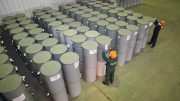This is my second-last editorial for The Northern Miner, as I will soon depart to join gold miner Agnico Eagle Mines as a senior geologist in their Toronto head office, working on technical writing. Before I go, I’d like to pass on some lessons learned after 23 years at the Miner, including the past 14 years as editor-in-chief, beginning with some writing tips for aspiring business writers.
Three big questions
The following are the three most important questions a journalist can ask him- or herself about every bit of their writing: Is it true? Is it news? And is it boring?
If you’re not 100% sure the statement is true, then never put it into your business writing. And there’s a world of difference between writing, “the company will mine 50,000 oz. gold next year” — which is a gamble on the future — and the far more truthful, “the company plans to mine 50,000 oz. gold next year.”
The second question arises with newer business writers, where what may be “news” to them may not be so to any industry veteran. In this case, the newer writer should simply count it as time spent on background research.
If your story survives the trial of the first two questions, the answer to the third question may yet kill your story.
The Churchill rule
Winston Churchill’s best writing advice is to use Anglo-Saxon words rather than Latin- or Greek-rooted words whenever possible. They’re shorter and punchier. This may be a tough habit to break for technically trained people who are used to writing phrases like “auriferous lacustrine sediment” instead of “gold-bearing lake mud.”
If you find you have four or five Latin-rooted words in a row, throw in an Anglo-Saxon replacement to liven up the sentence. If you don’t know the roots of words, get an Oxford English Dictionary and look up every word for which you don’t know the root.
Write for the ear, and read your copy out loud before publishing it. If you can’t finish a sentence in one breath, it’s probably too long.
Fight for brevity wherever possible to make the writing livelier and show respect for your readers’ valuable time. In every sentence, fight to reduce word count, letter count and syllable count. It’s the literary equivalent of making maple syrup — boil off the excess to intensify the remaining flavour.
For timeless writing advice, read The Elements of Style by Strunk & White, and for nuts and bolts journalism tips, the most recent edition of the Canadian Press Stylebook will do.
Keep your humanity
Get everyone’s name and job titles correct, even if it’s extra work to track down someone at the back of a photo. Get the correct pronunciation of names beforehand if recording audio or moderating a panel.
Have respect for people’s work and effort, even if it has led to failure, and never be flippant.
Your business stories should have people front and centre, and their decisions and effort pushing events forward. Write in the active rather than passive voice so it is clear who is responsible for any action.
In business writing there should be no ambiguity of meaning or excess cleverness. And when writing for an industry like mining, keep in mind that many readers have English as a second language and are living in a different country, season or time zone than the writer.
Evoke emotions, but don’t tell people how to feel
Writing that evokes emotions in readers is more appealing, so even a business writer needs to have an idea about what they’re doing in this area. Evoking curiosity, especially in a headline, is a great place to start in business writing if no other emotion comes immediately to mind.
There is fine line, however, in writing to evoke emotions and the mistake of telling people how to feel. For instance, a mining-equipment supplier and an environmentalist may have very different emotions to the same news of an open-pit mine being built in their backyard.
So give room in your writing for a variety of emotional responses from readers. Less refined, boosterish mining reporting, for instance, would frame a new open-pit mine as an unquestionable good for the area, when reality is never that simple.
Getting a job in business writing
For anyone applying to work as a business journalist, make sure you thoroughly research the media outlet where you’re seeking employment, and tailor your resume, cover letter and interview strategy to each potential employer and their needs.
That way, you’re demonstrating the same skills you’d use while working for them as a journalist, where you would research companies and people every day.
The employer is only interviewing people they think can do the job, so only proving you can do the work isn’t enough. You need to show why you should be hired.
Potential employers aren’t all that interested in how a position will help you in your personal growth story. They want to know how you can make a contribution to the company in the near-term, and bring in more revenue than the cost of employing you.





10 years ago I went to Canada for the money show. Was not familiar with the northern miner. So I spoke to the northern miner. I came away with a subscription to Florida. I looked forward to my paper. I believe it was one of my better decisions. Thank you John Cummings. Best wishes- Robert Newlin Indialantic, Florida.